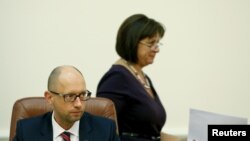The International Monetary Fund will not give more aid to Ukraine until it becomes clear that, in the event of a government collapse, the next government would follow through on promised reforms, the country's Finance Minister Natalia Yaresko said on Monday.
Ukraine has been waiting since October for the IMF to dispense more aid as part of a $40 billion package. The aid is contingent on the war-torn country making its economy more competitive and reducing corruption.
The patchy performance of Prime Minister Arseny Yatseniuk's government in implementing reforms, coupled with domestic political squabbles, have delayed the disbursement of a third tranche worth $1.7 billion.
The government is reeling from the shock exit of its economy minister last week, and Yaresko's comments underline the extent to which the political crisis engulfing Ukraine threatens to derail its relationship with foreign creditors.
Low approval ratings for Yatseniuk's government have raised expectations of a major ministerial reshuffle, and the government also could face a no-confidence vote in parliament around the middle of February.
Asked in a television interview whether the IMF would stop lending to Ukraine because of the crisis and a possible government collapse, Yaresko said: "I think their [the IMF] approach is not political, but they will wait until it becomes clear who the executive authorities are and whether these authorities will take the responsibility to fulfill the conditions under which they have already provided us with $6.7 billion."
"They can provide [financial assistance] to another government but another government must take the responsibility and commitment that we took on a year ago," she said, speaking on a talk show on the Ukrainian TV channel ICTV.
An IMF spokesman in Washington could not immediately be reached for comment.
Economy Minister Aivaras Abromavicius quit the government last week saying he would not become a "puppet" for corrupt vested interests, and accused a close ally of President Petro Poroshenko of trying to hijack control of his ministry.
His departure shone an uncomfortable spotlight on Ukraine's efforts to reform itself, which its Western-backed government pledged to do when it came to power after the Maidan protests in the winter of 2013/2014. Ukraine's backers had championed Abromavicius as a leading reformer.
In Washington, IMF managing director Christine Lagarde last week said Abromavicius' resignation was "of concern" but mentioned no changes to Ukraine's funding program.
Ukraine relies on money from the IMF, the United States and the European Union to stay afloat. Its economy shrank by more than 10 percent last year, dragged down by its war against pro-Russian separatists, who have taken control of a swath of the country's eastern industrial heartland.





